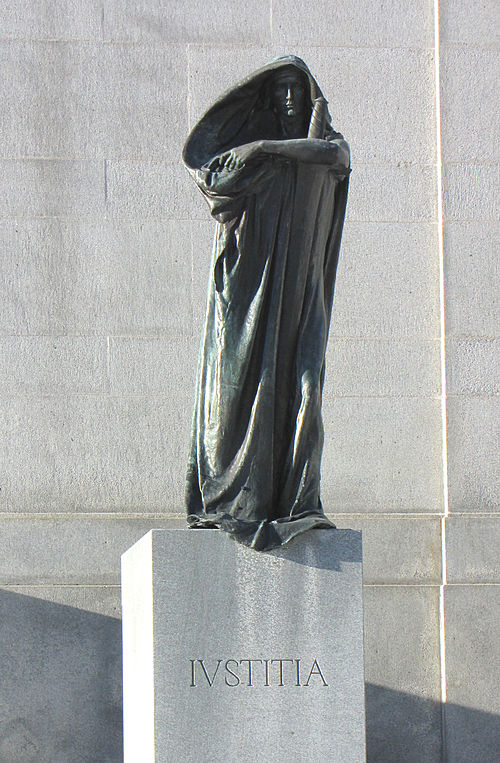Justicenoun
The state or characteristic of being just or fair.
Justicenoun
The ideal of fairness, impartiality, etc., especially with regard to the punishment of wrongdoing.
Justicenoun
Judgment and punishment of a party who has allegedly wronged another.
Justicenoun
The civil power dealing with law.
Justicenoun
A title given to judges of certain courts; capitalized as a title.
Justicenoun
Correctness, conforming to reality or rules.
Justicenoun
The quality of being just; conformity to the principles of righteousness and rectitude in all things; strict performance of moral obligations; practical conformity to human or divine law; integrity in the dealings of men with each other; rectitude; equity; uprightness.
Justicenoun
Conformity to truth and reality in expressing opinions and in conduct; fair representation of facts respecting merit or demerit; honesty; fidelity; impartiality; as, the justice of a description or of a judgment; historical justice.
Justicenoun
The rendering to every one his due or right; just treatment; requital of desert; merited reward or punishment; that which is due to one's conduct or motives.
Justicenoun
Agreeableness to right; equity; justness; as, the justice of a claim.
Justicenoun
A person duly commissioned to hold courts, or to try and decide controversies and administer justice.
Justiceverb
To administer justice to.
Justicenoun
the quality of being just or fair
Justicenoun
the administration of law; the act of determining rights and assigning rewards or punishments;
Justicenoun
a public official authorized to decide questions bought before a court of justice
Justicenoun
the United States federal department responsible for enforcing federal laws (including the enforcement of all civil rights legislation); created in 1870
Justice
Justice, in its broadest sense, is the principle that people receive that which they deserve, with the interpretation of what then constitutes being impacted upon by numerous fields, with many differing viewpoints and perspectives, including the concepts of moral correctness based on ethics, rationality, law, religion, equity and fairness. Consequently, the application of justice differs in every culture.
Charitynoun
(countable) An organization, the objective of which is to carry out a charitable purpose.
Charitynoun
(countable) The goods or money given to those in need.
Charitynoun
(uncountable) Benevolence to others less fortunate than ourselves; the providing of goods or money to those in need.
Charitynoun
In general, an attitude of kindness and understanding towards others, now especially suggesting generosity.
Charitynoun
Christian love; representing God's love of man, man's love of God, or man's love of his fellow-men.
Charitynoun
Love; universal benevolence; good will.
Charitynoun
Liberality in judging of men and their actions; a disposition which inclines men to put the best construction on the words and actions of others.
Charitynoun
Liberality to the poor and the suffering, to benevolent institutions, or to worthy causes; generosity.
Charitynoun
Whatever is bestowed gratuitously on the needy or suffering for their relief; alms; any act of kindness.
Charitynoun
A charitable institution, or a gift to create and support such an institution; as, Lady Margaret's charity.
Charitynoun
Eleemosynary appointments [grants or devises] including relief of the poor or friendless, education, religious culture, and public institutions.
Charitynoun
a foundation created to promote the public good (not for assistance to any particular individuals)
Charitynoun
a kindly and lenient attitude toward people
Charitynoun
an activity or gift that benefits the public at large
Charitynoun
pinnate-leaved European perennial having bright blue or white flowers
Charitynoun
an institution set up to provide help to the needy












